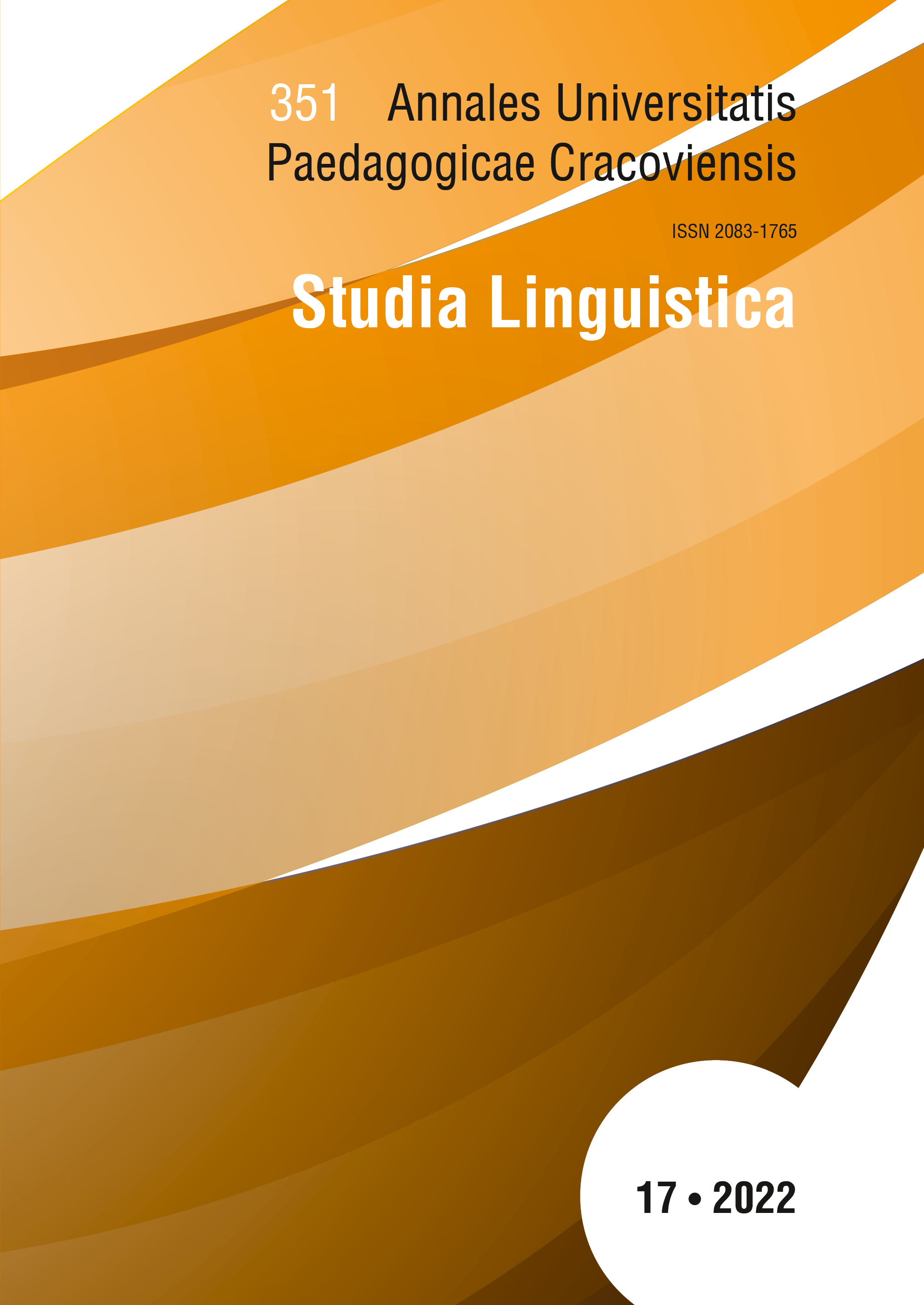What is a decent person [porządny człowiek]? On selected uses of the adjective decent [porządny] in contemporary Polish
Main Article Content
Abstract
The aim of the article is an attempt to answer the question of what Polish speakers mean when describing someone as porządny [decent]. Over 2,000 sentences taken from the MoncoPL corpus were studied, containing combinations of the adjective under study with nouns: człowiek, osoba, mężczyzna, facet, chłopak, kobieta, dziewczyna [man, person, guy, boy, woman, girl]. The analyzes were preceded by a review of lexicographic definitions as well as concepts of a decent man. Research has shown that the adjective porządny denotes a bundle of positive traits that are concretized depending on the context. Only in relation to women, the analyzed term is more precise and refers to the sexual and moral sphere.
Downloads
Article Details

This work is licensed under a Creative Commons Attribution-NonCommercial-NoDerivatives 4.0 International License.
Author, submitting a text to the editorial board of the journal “Annales Universitatis Paedagogicae Cracoviensis. Studia Linguistica", certifies that the content of the article has not been published so far and that the work does not violate in any way the copyright or related rights of other person, as well as other rights of third parties, and that no one's rights to the work (or any part thereof) have been missed. After signing the contract, the property rights to the published materials are transferred to the University of the National Education Commission, Krakow.
“Annales Universitatis Paedagogicae Cracoviensis. Studia Linguistica” is an open access journal, and all its content is made available free of charge to users and institutions under the Creative Commons CC-BY-NC-ND 4.0 license (attribution, non-commercial use, no derivative works). Under this license, the authors agree that their work may be lawfully reused for any purpose, except for commercial purposes, without the prior consent of the author or publisher. Everyone can read, download, copy, print, distribute and process these works, provided that the author's marking and the original publication place are correct. Published texts may not be used to create derivative works (e.g. to translate and publish in another language without the consent of the publisher). This is in line with the BOAI (Budapest Open Access Initiative) definition. "Studia Linguistica" does not charge for submitting or processing articles.
References
Boryś W., 2005, Słownik etymologiczny języka polskiego, Kraków.
Google Scholar
Buksiński T., 2001, Moderność, Warszawa.
Google Scholar
Collins Online English Dictionary, https://www.collinsdictionary.com/ (dostęp 30.07. 2021).
Google Scholar
Dąbrówka A., Geller E., 1995, Słownik antonimów, Warszawa.
Google Scholar
Jedynak S., 1999, O banalności intuicji, „Przegląd Filozoficzny – Nowa Seria” VIII, nr 1 (29),
Google Scholar
s. 193–198.
Google Scholar
Karwatowska M., 2017, Przyzwoitość w świadomości studentów lubelskich, „Białostockie Archiwum Językowe”, s. 93–105, DOI: 10.15290/baj.2017.17.05
Google Scholar
Karwatowska M., 2018, Historia „niewielkiego słowa”, czyli o przyzwoitości, „Stylistyka” XXVI, s. 87–103, DOI: 10.25167/Stylistyka27.2018.6
Google Scholar
Kotarbiński T., 1985, Medytacje o życiu godziwym, Warszawa.
Google Scholar
Maryn-Stachurska D., 2019, O znaczeniu przedmiotowym i metatekstowym jednostek normalny i normalnie, „Polonica” XXXIX, s. 179–191.
Google Scholar
Nowak S., 2011, System wartości społeczeństwa polskiego, „Studia Socjologiczne” 1(200), s. 261–278.
Google Scholar
Parysek J., Mierzejewska L., 2020, Porządne miasto porządnych mieszkańców, „Studia Miejskie”, t. 39, s. 11–27.
Google Scholar
Puzynina J., 1982, Językoznawstwo a aksjologia, „Biuletyn Polskiego Towarzystwa Językoznawczego” XXXIX, s. 23–32.
Google Scholar
Skorupka S. (red.), 1991, Słownik wyrazów bliskoznacznych, Warszawa.
Google Scholar
Wierzbicka A., 1971, Kocha, lubi, szanuje, Warszawa.
Google Scholar
Wierzbicka A., 1999, Język – umysł – kultura, Warszawa.
Google Scholar
Żywczok A., 2020, „Człowiek porządny” – ideał wychowania moralnego. Na kanwie rozważań etycznych Tadeusza Kotarbińskiego, [w:] Wielogłos w myśli o wychowaniu.
Google Scholar
lat polskiej pedagogiki filozoficznej, red. S. Sztobryn, K. Dworakowska, Warszawa, s. 195–212.
Google Scholar
ESJPXVII/XVIII – Elektroniczny słownik języka polskiego XVII i XVIII wieku, https://sxvii.pl/ (dostęp 5.08.2021).
Google Scholar
ISJP – Inny słownik języka polskiego, red. M. Bańko, t. 2, Warszawa 2000.
Google Scholar
SIJP – M. Arct, Słownik ilustrowany języka polskiego, Warszawa 1916, http://mbc.cyfrowemazowsze.pl/dlibra (dostęp 5.08.2021).
Google Scholar
SDor – Słownik języka polskiego, red. W. Doroszewski, t. 1–11, Warszawa 1958–1969, http://doroszewski.pwn.pl (dostęp 5.08.2021).
Google Scholar
SL – S. Linde, Słownik języka polskiego, t. 2, Warszawa 1807–1814, https://kpbc.umk.pl/dlibra (dostęp 5.08.2021).
Google Scholar
SPXVI – Słownik polszczyzny XVI wieku, red. M. Mayenowa, t. 27, Wrocław 1999, https://kpbc.umk.pl/dlibra/publication/17781 (dostęp 5.08.2021).
Google Scholar
Sstp PAN – Słownik staropolski, red. S. Urbańczyk, t. 6, Wrocław 1953–2002, https://pjs.ijp.pan.pl/Sstp/t6.pdf (dostęp 5.08.2021).
Google Scholar
SStpA – M. Arcta Słownik staropolski, oprac. A. Krasnowolski, W. Niedźwiedzki, Warszawa ok. 1920, https://pl.wikisource.org/wiki/M._Arcta_Słownik_Staropolski (dostęp 5.08.2021).
Google Scholar
SWar – Słownik języka polskiego (tzw. Słownik warszawski), red. J. Karłowicz, A. Kryński, W. Niedźwiedzki, t. 6, Warszawa 1900–1927, https://crispa.uw.edu.pl/ (dostęp 5.08.2021).
Google Scholar
SWil – Słownik języka polskiego (tzw. Słownik wileński), red. A. Zdanowicz i in., Wilno 1861, https://eswil.ijp.pan.pl/ (dostęp 5.08.2021).
Google Scholar
USJP – Uniwersalny słownik języka polskiego, red. S. Dubisz, t. 3 i 4, Warszawa 2003.
Google Scholar
WSJP PAN – Wielki słownik języka polskiego PAN, red. P. Żmigrodzki, Kraków 2007–, http://wsjp.pl (dostęp 5.08.2021).
Google Scholar
